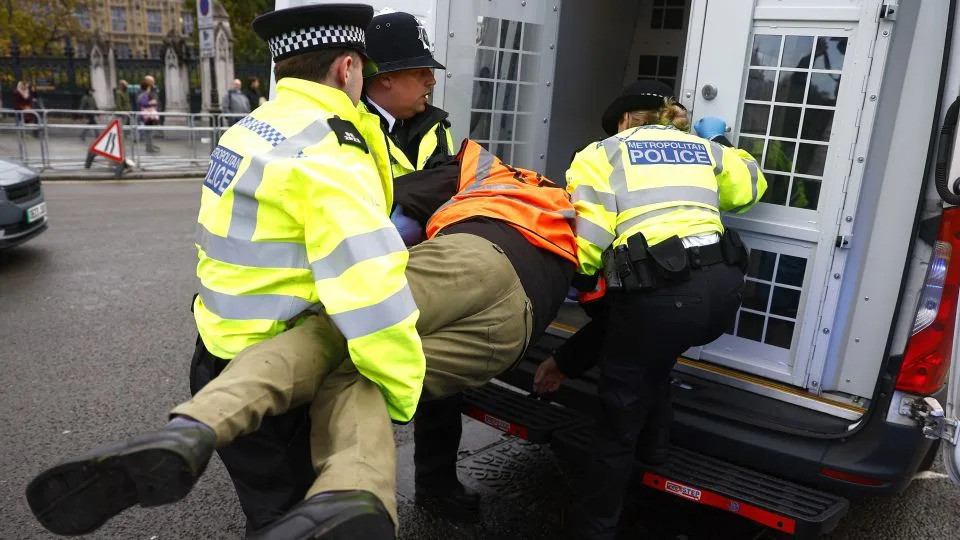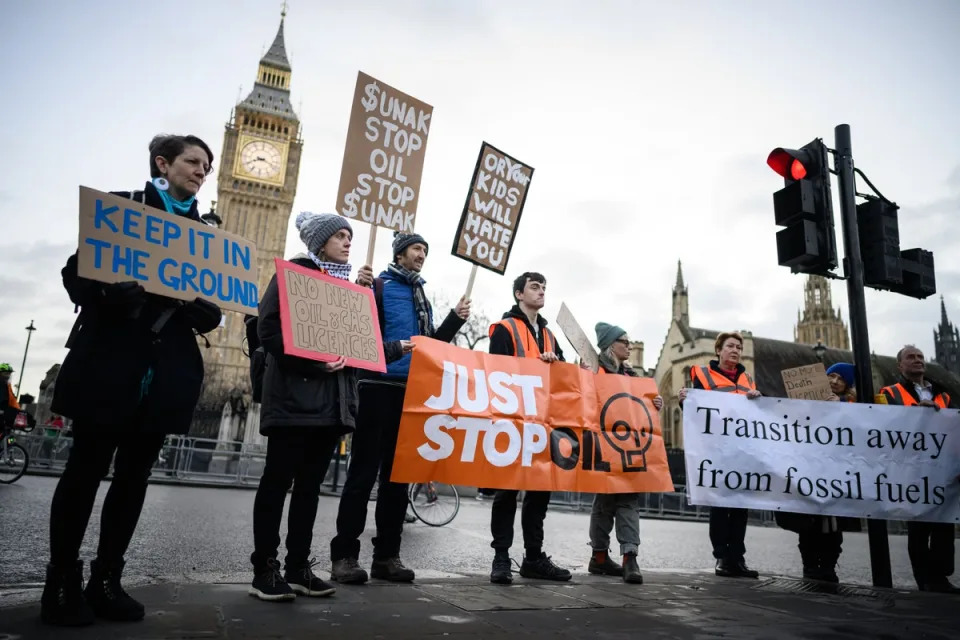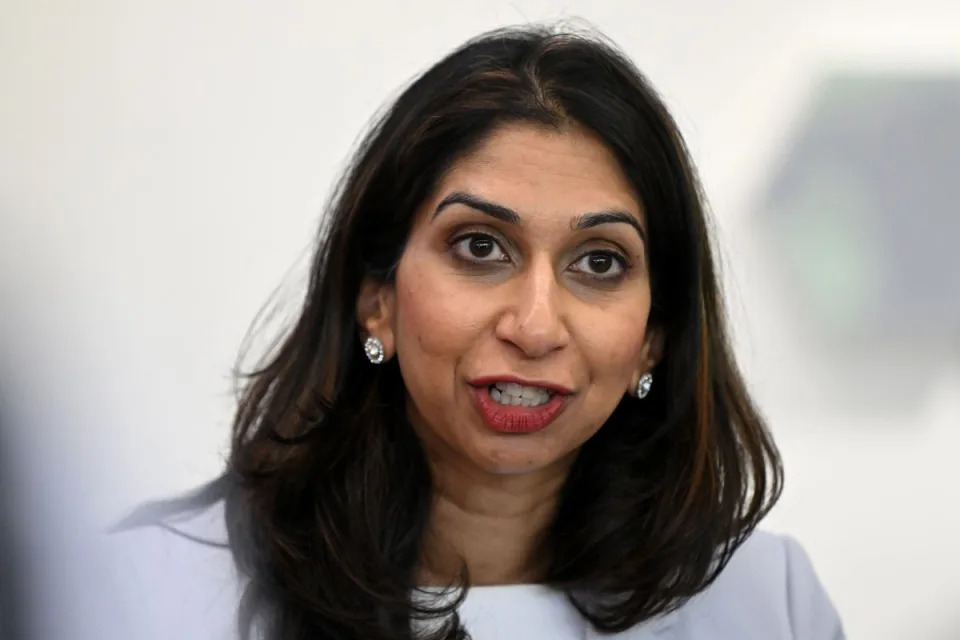Laura Paddison, CNN
Tue, January 23, 2024

A United Nations envoy said he was “alarmed,” “distressed” and “seriously concerned” by the treatment of climate activists in the United Kingdom, in a damning report published Tuesday that criticized “increasingly severe crackdowns” on peaceful protesters in the country.
Michel Forst, the UN’s Special Rapporteur on Environmental Defenders, who visited the UK earlier this month to meet with politicians, NGOs, activists and lawyers, said he had received “extremely worrying” information about peaceful protesters facing prosecution under “regressive” new laws, experiencing “harsh” bail conditions while awaiting trial, and being handed jail sentences.
British authorities have stepped up their response to climate and environmental protestors in recent years, especially when protests become disruptive, including blocking roads and slow walking tactics.
Last year, the the country introduced new legislation — the Public Order Act 2023 — giving police more power to stop protests. In December, the legislation was used to sentence a climate protester to a six-month prison term for taking part in a slow march on a public road as part of the activist group Just Stop Oil. The protester is now appealing the sentence.
“It had been almost unheard of since the 1930s for members of the public to be imprisoned for peaceful protest in the UK,” Forst wrote.
A spokesperson for the UK Home Office, the government department that tackles policing and other elements of national security, said that “while decisions on custodial sentences are a matter for the independent judiciary, the Public Order Act brings in new criminal offences and proper penalties for selfish, guerrilla protest tactics.”
Forst said he was “alarmed” to learn that some judges were banning defendants from explaining the motivation behind their protest, including mentioning climate change. “It is very difficult to understand what could justify denying the jury the opportunity to hear the reason for the defendant’s action,” he wrote.
The report referred to “highly concerning” information about “harsh” bail conditions for peaceful protesters awaiting trial — a period that could span up to two years — including wearing electronic ankle tags and curfews. “I seriously question the necessity and proportionality of such conditions for persons engaging in peaceful protest,” Forst wrote.
He also said he was “distressed” to see how environmental defenders are “derided” by the media and political figures in the UK. It puts them at risk of “threats, abuse and even physical attacks,” he said.
This “toxic discourse” can also be used by the government as justification for “adopting increasingly severe and draconian measures against environmental defenders,” he said.
“In the course of my visit, I witnessed firsthand that this is precisely what is taking place in the UK right now,” he said, adding this had a “significant chilling effect” on civil society and fundamental rights to peaceful protest.
“The right to protest is a fundamental part of our democracy,” the Home Office spokesperson told CNN, “but we must also protect the law-abiding majority’s right to go about their daily lives.”
Climate protesters are increasingly undertaking high-profile and disruptive actions. But the fact they cause disruption does not mean they are not peaceful, Forst said.
In January last year, one of the best known climate groups in the UK, Extinction Rebellion, announced it was pausing mass public disruption campaigns to focus on building more support.
But other organizations have scaled up their protests. Last year, Just Stop Oil, for example, disrupted several major sporting events in England, including Wimbledon, the Ashes cricket test series and the World Snooker Championship, as well as a performance of the musical “Les Misérables.”
UN expert slams government crackdown on environmental protest
Zoe Grunewald
Tue, January 23, 2024

The Police, Crime and Sentencing Act has been deemed “regressive” by an expert representative of the UN (Getty Images)
A government crackdown on the right to protest has had a “significant chilling effect” on civil society and the exercise of fundamental freedoms, the UN Special Rapporteur said today.
Michael Forst, the UN special rapporteur on environmental defenders, released a statement following a two-day visit to the UK, where he observed first-hand the treatment of protestors under UK law.
He said after meeting with lawyers, NGOs, climate activists and government officials, he was issuing a statement in “light of the extremely worrying information” he had received regarding the “increasingly severe crackdowns on environmental defenders in the United Kingdom, including in relation to the exercise of the right to peaceful protest”.

Eco-activists and human rights campaigners have protested the raft of anti-protest laws that have been introduced by the government over the last few years (PA Archive)
Mr. Forst condemned the government’s use of widespread restrictions on peaceful protests, referring to them as “a matter of concern for any member of the public in the UK who may wish to take action for the climate or environmental protection.”
He emphasized, “The right to peaceful protest is a basic human right. It is also an essential part of a healthy democracy.
“States have a duty to facilitate the right to protest, and private entities and broader society may be expected to accept some level of disruption as a result of the exercise of this right.”

The UN expert called for the protection of eco-activism, stating “environmental defenders are acting for the benefit of us all” (Getty Images)
The UN special rapporteur also highlighted that new rules imposed on defendants in one London court prevented them from explaining their motivations to the jury. In another court, peaceful protesters were forbidden from mentioning the climate crisis, fuel poverty, or even the US civil rights movement in their statements.
“It is very difficult to understand what could justify denying the jury the opportunity to hear the reason for the defendant’s action, and how a jury could reach a properly informed decision without hearing it,” Forst said.
Mr. Forst criticized the Police, Crime, Sentencing and Court Acts, which became law in 2022, as “regressive” and revealed that those charged under this legislation were subject to harsh bail conditions for up to two years.
These conditions included prohibitions on engaging in any further protest, contact with those in their campaign groups, curfews, requirements to wear electronic ankle tags, and GPS tracking. The rapporteur also pointed out that prior to the Act being introduced, it had been “almost unheard of since the 1930s” for peaceful protesters to be imprisoned in the UK.
Mr Forst also condemned the “toxic” discourse around protest in the UK, stating that it “may also be used by the state as justification for adopting increasingly severe and draconian measures against environmental defenders.” Forst spoke out due to the gravity of his concerns about the widespread restrictions on peaceful protest, and says his investigations are ongoing as he considers formal complaints about treatment that have been submitted to him.

The former home secretary Suella Braverman spear-headed the Police, Crime, Sentencing and Courts Act in 2022 (PA Wire)
He concluded: “We are in the midst of a triple planetary crisis of climate change, biodiversity loss and pollution. Environmental defenders are acting for the benefit of us all. It is therefore imperative that we ensure that they are protected.”
He called for a constructive dialogue with the Conservative government to ensure that members of the public seeking to protect the environment were not subject to persecution, penalization, or harassment for doing so.
Appointed by the Human Rights Council of the UN, special rapporteur’s act independently of governments and play an important role in monitoring sovereign nations and democratically elected governments and policies.
The UN special rapporteur is appointed under the Aarhus Convention, to which the UK is a signatory.

No comments:
Post a Comment